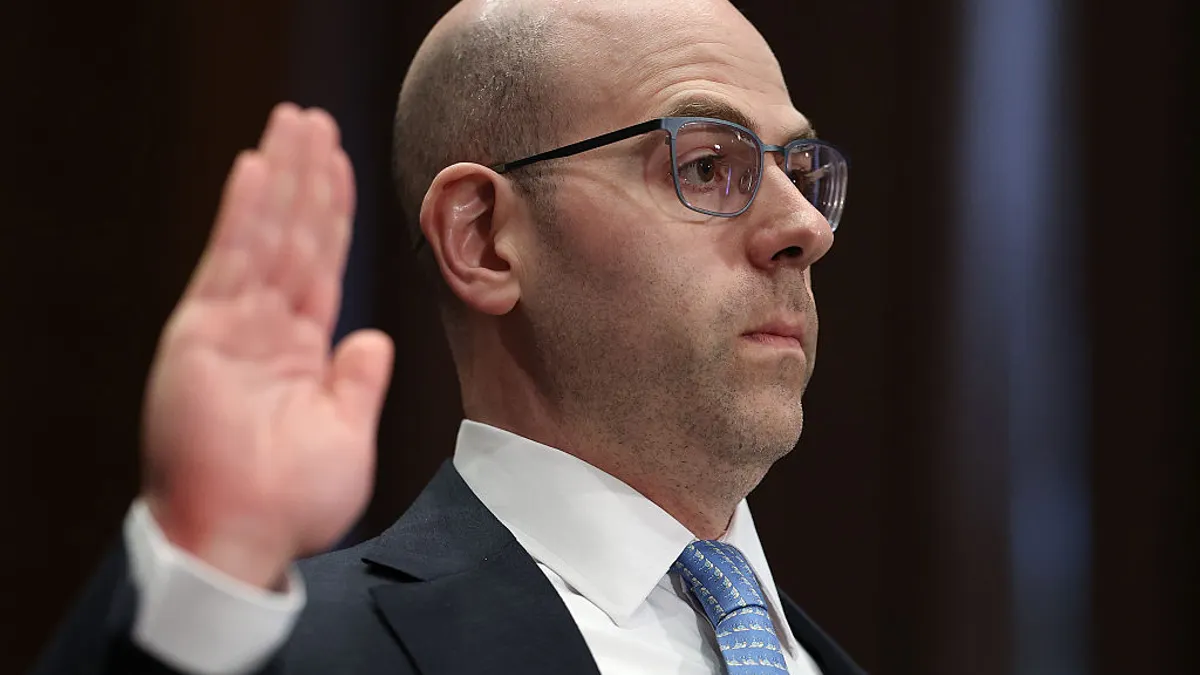By some measures, IMAX CFO Natasha Fernandes is both a classic CFO and an unlikely movie mogul.
Fernandes, 44, didn’t grow up going to many movies, still needs to make a concerted effort to keep up with the industry stars and players, and sees herself as more of a back-office finance executive who happened to land at a “fun” company, she told CFO Dive.
“The funniest thing about my role is that I have never been into Hollywood,” Fernandes said, noting that she now does go to the movies frequently — liking most types except for horror — though you won’t find her at a lot of film openings or premieres. “The CFO position doesn’t necessarily get all the flashiness.”
Fernandes’ down-to-earth style belies the fact that she pulled off what remains a relatively rare feat for women: she took the top finance spot at the large-format cinema company in 2022, after working her way up the IMAX ranks for about 15 years. Currently, just 17.8% of sitting CFOs at Fortune 500 and S&P 500 companies are female, with the average age of new CFOs hovering around 51, according to a recent Crist Kolder Associates study.
Homegrown talent
At the time of her CFO appointment, the Toronto-born Fernandes was dubbed a “homegrown talent” by CEO Rich Gelfond, who praised her strategic thinking, acumen and determination.
She has spent much of her career at IMAX, which has headquarters in New York, Toronto and Los Angeles. After earning a Bachelor of Business Administration in accounting and finance from Wilfrid Laurier University in Ontario, Canada, Fernandes became an audit manager at Big Four accounting firm Deloitte, according to her LinkedIn profile. In 2007, wanting to transition out of public accounting, she jumped to IMAX to take a position managing financial reporting.

She came in, built a financial reporting team and oversaw accounting for all the revenue recognition and accounting standard implementation at IMAX. She then became director of financial reporting and assistant controller, and later took the roles of corporate treasurer and deputy chief finance officer.
On top of a strong work ethic and drive to improve whatever she is working on rather than accepting the status quo, Fernandes credits her willingness to take on different roles — including the treasurer role which didn’t initially interest her — and the human connections and relationships she built working in various finance locations for her rise to her current CFO role.
“A lot of my success stems from years of getting a front seat in front of people who were interested in my work,” she said, noting that she wonders how young generations will be able to get that experience if they are working remotely. “In the end, when the CFO position became open at IMAX, it really came down to who...put my name forward and others who came alongside and supported that position.”
Fernandes, who is of Trinidadian heritage, also has some encouraging advice for executives from diverse backgrounds: be confident. “You’ve risen to this level because of your abilities to perform and be successful...so part of it comes to knowing that you can do the job in a world where you are surrounded by male counterparts or those from a different background,” she said.
Needed discipline
Fernandes, whose compensation last year totaled $1.48 million according to a securities filing, has earned praise from analysts. Her open communication style, which included providing more guidance on data such as EBIDTA margins and effective course-correction of some of IMAX’s past tendencies to overspend on new initiatives, represent welcome changes, analysts say.
“Any skepticism that I would normally have for a new CFO has fallen away,” Alicia Reese, VP of equity research for media and entertainment at Los Angeles-based investment firm Wedbush Securities, said in an interview. Fernandes plays a “significant role” in managing expenses as well as in how the company funds its growth and keeps new initiatives in check, Reese said.
“In the distant past IMAX has made some pretty big missteps with new business ventures before Natasha’s time,” she said. “But it’s very clear that the new initiatives that IMAX is going forward with now are disciplined and I think she’s disciplined in her view in how much you put toward a new venture before you have any real insight into what it can bring back to the company,”
Among the stumbles before Fernandes’ tenure: an underperforming bet on Marvel’s “Inhumans” television series. The company’s investment in Inhumans yielded a $11.1 million impairment charge in Q3 2017, company executives said on an Oct. 26 conference call according to a Seeking Alpha transcript, in which they also noted that they would take a more “modest approach” to capital investments.
Bringing theatergoers back
Eric Wold, a senior equity analyst at B. Riley Securities, who has covered IMAX for over 20 years, also said he has seen Fernandes chart a more careful financial course. “She’s been a lot more disciplined in where they spend, how they spend and who they want to work with, and you've seen that in the results so far,” he said in an interview.
At a time when the movie industry is both struggling to entice theatergoers back into theaters after the pandemic and grappling with fewer movies to show due to last year’s Hollywood strikes, financial headwinds still buffeted the company’s 2Q results. IMAX’s revenue fell 9% to $89 million from the year-earlier period, but beat the expected consensus estimates of $75 million, Wold wrote in a July 25 report. At the same time, Fernandes said the company’s market share of total box office earnings in North America has risen to 5.2% this year to date from 3.2% in 2019 before the pandemic.
Citing those box office share gains, along with IMAX’s strategy to reduce its reliance on Hollywood films by offering more documentaries such as “The Blue Angels” on U.S. Navy pilots and its offering of a strong slate of blockbuster action films like “Deadpool & Wolverine,” Wold rates IMAX a buy, and describes the company as “the strongest way to play the global box office recovery.”
Catching a “Beetlejuice, Beetlejuice” IMAX showing in Chicago can cost you about $27 compared to the $19 price to see it on a regular screen. But Wold, noting that IMAX doesn’t set the ticket prices, believes the premium cost won’t put off moviegoers, maintaining there is appetite for the higher-end experience. “Surprisingly in this tough macro environment, we haven’t seen consumers pull back on either choosing the premium tickets or the concession purchases in the theater. It’s a relatively inexpensive escape,” he said.
Whales, bears…and ROI
Founded in the 1960s, IMAX’s business model has evolved since its early days when it was known for nature and science documentaries, shown on big screens, often with stadium seating in museums. Its beginnings were what CEO Gelfond described as its “whales, bears and seals” era, according to a 2022 report in The New York Times. Fast forward to today, and the business model has changed considerably, with the company making a big push in the last decade or so toward showing so-called Hollywood “tentpole” films, Wold said.
Now, in the wake of the writers strike, it has again sought to diversify to reduce its reliance on big name films. For example, the company has been bringing in new content like concert films, local language Chinese films as well as screenings of one-off events such as the Paris Olympics into the IMAX system, Fernandes said. As CFO, she spends a lot of time analyzing whether that new alternative content will deliver a higher return, she noted.
“I’ll essentially work on what the ROI is and, if you’re going to pick a film, what does the green-light model look like?,” she said. “We are making decisions about whether we want to be involved in distributing the content across our network.”
The company has what it terms an “asset-lite” business model; it doesn’t own or operate the theaters that show its content. Instead, it is effectively an entertainment technology company, which licenses the IMAX system of screens, technology, software and cameras to exhibitors, studios and other partners. As of June 30, there were 1,780 systems operating globally compared to 1,718 a year earlier, according to a securities filing.
Despite the industry’s volatility, the company also has a relatively strong balance sheet thanks in part to a convertible debt deal Fernandes led in 2021 when she was corporate treasurer. The deal comprised $230 million in convertible senior notes with a 0.5% coupon due in 2026, and the transaction was one of a number of steps that the company pursued to stabilize is finances after the pandemic initially forced IMAX to shut down its global network.
“It was a really great piece of paper,” Fernandes said of the debt. As to her exit strategy from the debt, she is already assessing options ahead of the notes becoming current in Q2 of next year and talking to banks on an ongoing basis.
It’s that kind of institutional knowledge that makes some analysts favor insider CFOs like Fernandes. “It helps that she’s come up through the channels,” Reese said. “That’s a good path…you have so much knowledge about the company when you come up through the financial department.”























